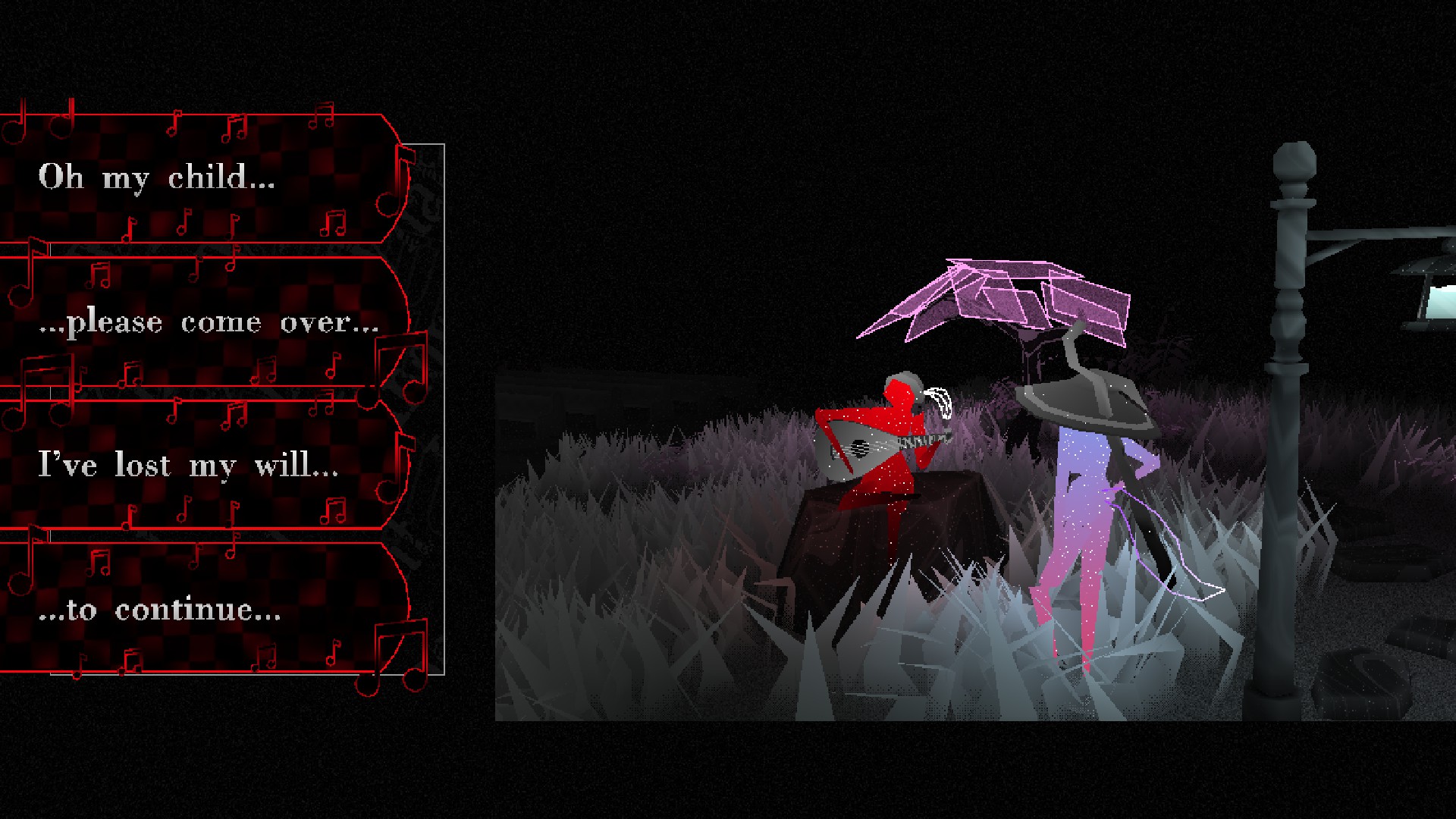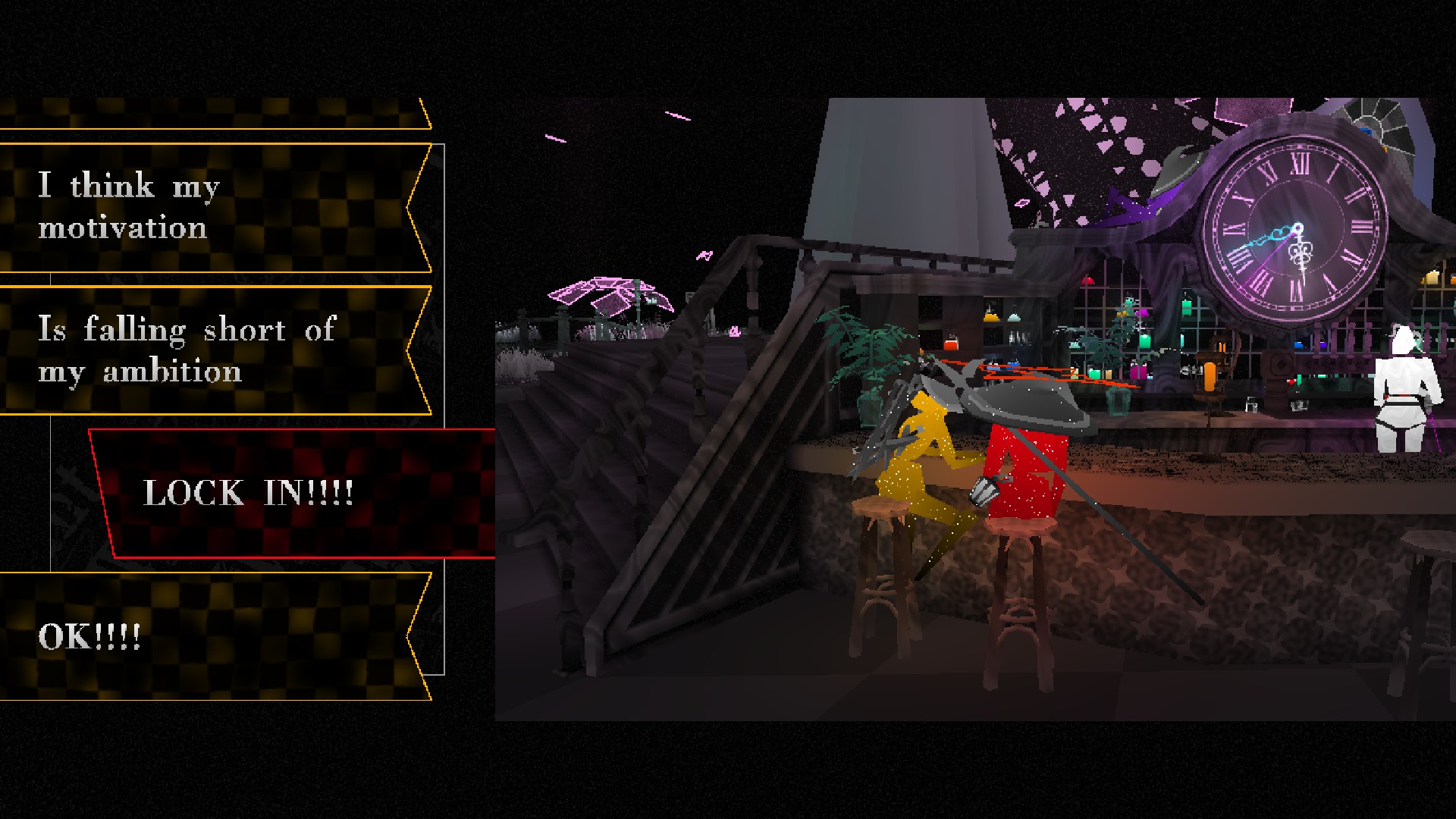I need to know
What is this A petite, dreamlike rhythm game with stunning graphics.
Release date October 22, 2025
Expect to be paid $15/£12.79
Publisher Media Dreamware
Developer Alice Bottino, Chancellor Wallin
Review on Windows 11, NVIDIA GeForce RTX 3060 TI, Intel Core i7-12700F, 16 GB RAM
Multiplayer mode Thread
Steam deck Verified
To combine Couple
You’re running out of time. You’ll certainly have less of it by the time you finish reading this review, and even less if you decide to pick up Hyperbeat: a rhythm game that hooked me with its quirky UI, low-resolution dreamscapes, and atmospheric central hub full of NPCs eager to introspect with you. It’s a petite, raw world that quickly enchanted me.
Every step you take in the hub world – a liminal space and bar called the Well – is punctuated by the sound of seconds ticking by, and each level ends with you hitting a clock and breaking it. You begin conversations with other characters with a beat, both metaphorical and literal, long enough to fill the quarter rest symbol in musical notation. I only spent a few hours with Hyperbeat, but it made me appreciate every passing beat.
Time flies
So I was impressed when his levels made me lose track of time after all the fuss about clocks and such. In each stage, you, a faceless knight, glide through an abstract tunnel, trying to capture button prompts as they fly by, colliding with them, or swinging your weapon at them to the beat of the song. Think of an on-rails shooter like Star Fox 64, but your goal is to fly into targets rather than shoot down enemies.
The user interface and control setup are unlike any rhythm game I’ve played, so much so that I kept switching between the gamepad and mouse, wondering which was more comfortable.
In this sense, the newness of Hyperbeat is something of a double-edged sword. These flights move quickly, even chaotically on higher difficulties, and various UI elements shout at you from so many directions that you can easily become cross-eyed, dizzy, or even nauseous. I got used to it after a while, but your mileage may vary if you’re prone to motion sickness or styling-induced headaches.
That said, once it clicks, everything feels special. Flying through targets is exhilarating and scratches a hard-to-reach part of my brain to glide and slice through each note in pursuit of perfectly timed “clean” hits. Graphs reward exact precision; if I ever got an “OK” or missed a note, I was always sure my timing was wrong.
It’s also especially accessible for a rhythm game, despite the visual chaos. Each song has three levels of difficulty, and on the lower end of the spectrum, most objectives don’t require you to press a button as the notes fly by – you just fly through them or follow them through a winding tube. It’s a good way to get your bearings and learn the songs, which was crucial for me before trying the higher difficulty levels.
There is no failure status on any difficulty level that I have identified, but the hardest charts are so crazy and filled with goals that the thought of spending hours and hours to get a perfect score on them makes me shudder.
Maybe I’ll give it a try, if only to spend more time with the game’s songs. As I write this, I still have some of the best games in the series on my mind, though Hyperbeat doesn’t match the variety of licensed music in other rhythm games.
At its best, the game put me in a flow state where the barriers between me and the hypnotic musical races felt deliciously gaunt.
These are all pleasant shades of original electronica, from glitchy and mid-tempo to lo-fi, hot and relaxing. Sometimes it’s a tonal mismatch with the frenetic action on screen, but I appreciated that the charts didn’t always align with the most prominent melody or sync with the drums – sometimes providing their own additional percussion instrument that takes advantage of the sound of your playing.
At its best, the game put me in a flow state where the barriers between me and the hypnotic musical races felt deliciously gaunt. It’s all the challenging skill and score-chasing of Guitar Hero, but with the unique, added fun of flying in 3D space.
Downtempo
This brings me to my gripes with Hyperbeat: First, it’s just too brief. It’s an indie rhythm game with about 90 minutes of music in its name, so I’m not mad that it only takes an hour or two longer to complete, but I do wish the game had forced me to master it better. The greatest excitement of Hyperbeat is contained in the more complex variants of each song, but you can beat the game without trying them; it would be nice to chase high scores with more specific incentives than hunting collectibles or other goals I set for myself.
And its narrative, which follows several of the hub NPCs I mentioned earlier, sometimes feels like it’s rushing to enlighten you before the credits roll. It raises compelling questions: Is pushing the limits at a miserable day job worth the theoretical long-term payoff? When does planning for the future demand so much that it kills the desire for the present moment? Is all that time you spend playing rhythm games a waste of time? Eventually you run out.
He tends to pose these questions a bit clumsily; the side characters at the center like to talk about their fears to you, and then, before you have a chance to engage with them, they give you precise advice on how to deal with them. Even the reminder text when you repeat a stage but don’t improve your score notes, “no time spent on passion can be considered wasted.” It never comes off as insincere, but once you get past the mysterious façade, the rest is filled with platitudes where it’s not necessary.
The most touching moments of this story took place in the tranquil silence of the Source as we pondered the unanswered questions.
It may sound like I don’t care about the dialogue, but sometimes it’s great. There were cheeky jokes throughout, many of which were smirk-inducing, and there were moments where I found myself talking to my fellow knights about their unresolved malaise about art-making, failure, and loneliness that stuck in my throat.
It was tough not to feel the tangle of their melancholy reach out and pull me into my own anxieties, my wasted time trying to make a living as a writer. It’s because I was so fascinated by these moments that I wish the rest of Hyperbeat weren’t willing to serve up platitudes like “be kind to yourself” and “growing up is never comfortable.” The most touching moments of this story took place in the tranquil silence of the Source as we pondered the unanswered questions.
That said, I would still recommend Hyperbeat to anyone with even a passing interest in its unique and unique take on the genre. The levels were so addictive that I couldn’t wait to play more of them; and while there’s not much to say about the modding scene yet, the game does support the Steam Workshop for custom charts (we’ll see how long it takes to get through the fire and flames). Ultimately, it only costs $14.99 and can be completed in one afternoon. Time well spent.



